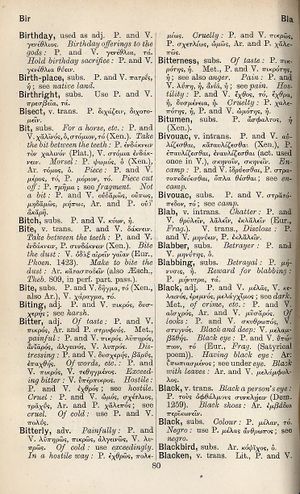bitter: Difference between revisions
φύγεν ἄσμενος ἐκ θανάτοιο → he was glad to have escaped death
(nlel) |
m (Woodhouse1 replacement) |
||
| Line 1: | Line 1: | ||
{{Woodhouse1 | {{Woodhouse1 | ||
|Text=[[File:woodhouse_80.jpg|thumb|link={{filepath:woodhouse_80.jpg}}]] | |Text=[[File:woodhouse_80.jpg|thumb|link={{filepath:woodhouse_80.jpg}}]] | ||
===adjective=== | |||
of [[taste]]: [[prose|P.]] and [[verse|V.]] [[πικρός]], [[Aristophanes|Ar.]] and [[prose|P.]] [[στρυφνός]]. | |||
Met., | Met., [[painful]]: [[prose|P.]] and [[verse|V.]] [[πικρός]]. [[λυπηρός]], [[ἀνιαρός]], [[ἀλγεινός]], [[verse|V.]] [[λυπρός]]. | ||
[[distressing]]: [[prose|P.]] and [[verse|V.]] [[δυσχερής]], [[βαρύς]], [[ἐπαχθής]]. | |||
of [[word]]s, etc.: [[prose|P.]] and [[verse|V.]] [[πικρός]], [[verse|V.]] [[τεθηγμένος]]. | |||
[[exceeding bitter]]: [[verse|V.]] [[ὑπέρπικρος]]. | |||
[[hostile]]: [[prose|P.]] and [[verse|V.]] [[ἐχθρός]]; see [[hostile]]. | |||
[[cruel]]: [[prose|P.]] and [[verse|V.]] [[ὠμός]], [[σχέτλιος]], [[τραχύς]], [[Aristophanes|Ar.]] and [[prose|P.]] [[χαλεπός]]; see [[cruel]]. | |||
of [[cold]]: use [[prose|P.]] and [[verse|V.]] [[πολύς]]. | |||
}} | }} | ||
{{GermanLatin | {{GermanLatin | ||
Revision as of 08:51, 20 May 2020
English > Greek (Woodhouse)
adjective
of taste: P. and V. πικρός, Ar. and P. στρυφνός.
Met., painful: P. and V. πικρός. λυπηρός, ἀνιαρός, ἀλγεινός, V. λυπρός.
distressing: P. and V. δυσχερής, βαρύς, ἐπαχθής.
of words, etc.: P. and V. πικρός, V. τεθηγμένος.
exceeding bitter: V. ὑπέρπικρος.
hostile: P. and V. ἐχθρός; see hostile.
cruel: P. and V. ὠμός, σχέτλιος, τραχύς, Ar. and P. χαλεπός; see cruel.
German > Latin
bitter, amarus (nicht süß, herb, Ggstz. dulcis, eig. u. uneig.). – acerbus (beißend, scharf, Ggstz. mitis, suavis; bes. uneig. = »hart, streng«, wie Feind, Feindschaft, Haß; dann = »empfindlich treffend etc.«, wie Witz etc.). – gravis (heftig, wie Feind, Feindschaft). – mordax (beißend anzüglich, wie Verse, Worte etc.). – b. Geschmack, sapor amarus od. acerbus; im Munde (bei Krankheiten), os amarum: b. werden, inamarescere. – das Bittere des Verweises, quod acerbitatis habet obiurgatio: b. Klage führen, s. unten Adv.: jmdm. bittere Vorwürfe machen, aspere vituperare alqm: in sehr bitteren Ausdrücken jmdm. schreiben, acerbissime alci scribere: bittere Früchte von etw. ernten (bildl.), fructus magnā acerbitate permixtos ferre ex etc.: in der bittersten Armut leben, in summa egestate od. mendicitate vivere. – Adv.amare (eig. u. uneig.); acerbe. aspere. graviter (uneig.). – gegen jmd. b. (in Worten) sein, acerbe increpare alqm; acerbius invehi in alqm: jmd. recht b. kränken, alci quam acerbissimum dolorem inurere: sich d. beklagen (b. Klage führen) über etwas, graviter queri alqd; über jmd., acerbe od. graviter accusare alqm.

